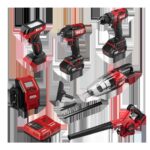Maintaining your tools is crucial for any automotive repair professional. Properly cared for tools ensure accuracy, efficiency, and longevity, ultimately saving you time and money. This guide outlines essential practices for the Care Of Tools, covering cleaning, storage, and maintenance.
Keeping Your Tools Clean
Clean tools are fundamental for accurate measurements and preventing damage to vehicle components. Regular cleaning removes dirt, grime, and corrosive materials that can hinder performance.
- After each use: Wipe down tools with a clean cloth or rag to remove loose debris and excess oil or grease. For heavier soiling, use a solvent-soaked rag, ensuring proper ventilation.
- Deep cleaning: Periodically disassemble tools for a thorough cleaning. Use appropriate cleaning solutions and brushes to remove stubborn dirt and buildup. Pay particular attention to moving parts and crevices.
- Rust prevention: Apply a light coat of oil to metal surfaces after cleaning to prevent rust formation, especially in humid environments.
Proper Tool Storage
Correct storage protects tools from damage and keeps them organized for easy access.
- Designated storage: Invest in a high-quality toolbox or tool chest with compartments to organize and separate tools. This prevents them from banging against each other and causing damage.
- Climate control: Store tools in a dry, temperature-controlled environment to minimize rust and corrosion. Avoid storing them directly on concrete floors, which can absorb moisture.
- Security: For valuable tools, consider a lockable toolbox or cabinet to prevent theft.
Regular Tool Maintenance
Routine maintenance ensures tools remain in optimal working condition and extends their lifespan.
- Sharpening: Regularly sharpen cutting tools like knives, shears, and drill bits to maintain their effectiveness. Dull tools require more force, increasing the risk of accidents.
- Lubrication: Apply appropriate lubricants to moving parts like hinges, ratchets, and gears to reduce friction and wear.
- Inspection: Periodically inspect tools for signs of damage, such as cracks, chips, or loose parts. Replace or repair damaged tools promptly to avoid safety hazards.
- Calibration: Ensure measuring tools, like torque wrenches and micrometers, are calibrated regularly to maintain accuracy.
Conclusion
Implementing these practices for the care of tools is essential for any automotive repair professional. Regular cleaning, proper storage, and routine maintenance ensure your tools remain reliable, accurate, and safe, maximizing their lifespan and contributing to your overall efficiency. Investing time in tool care ultimately leads to higher quality work and cost savings in the long run.


